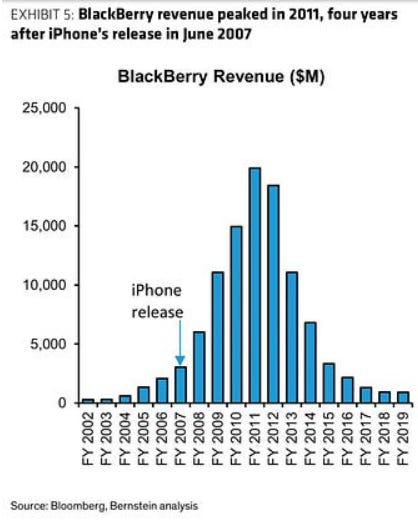BlackBerry Thrived In The Beginning Of The iPhone Era
What are the implications of this for Google?
Is Google Search Facing Its iPhone Moment?
Recently, I came across an illuminating graph showing BlackBerry's revenue history. What stood out was how BlackBerry's revenue actually peaked in 2011 - a full four years after the iPhone's introduction in 2007. This timing detail is crucial: even when revolutionary technology emerges, market shifts don't happen overnight.
This pattern made me wonder about Google Search's future in the age of AI-powered alternatives. I’ve been negative on Google since ChatGPT was released, and it’s been a lonely two years.
The Slow-Motion Disruption
The BlackBerry graph illustrates an important lesson: disruption often happens more slowly than we expect, then suddenly accelerates. BlackBerry didn't immediately collapse when the iPhone launched - in fact, they continued growing for years afterward as smartphone adoption expanded the overall market.
Similarly, Google Search won't disappear overnight, but the foundation of its dominance may be eroding gradually beneath the surface.
AI Is Changing Information Retrieval
Large Language Models have fundamentally altered how we can interact with information. I've personally migrated about 90% of my searches to Perplexity, preferring direct answers over hunting through links.
What's striking is that the core functionality of these AI search tools isn't particularly complex. This raises an interesting question: What's stopping companies like Meta from entering this space? With their resources and user base, they could potentially introduce competitive search products relatively quickly.
Google's Diversified Position
Unlike BlackBerry, Google has wisely diversified beyond its core product. While search advertising represents over half of Alphabet's revenue, the company has built multiple successful businesses:
YouTube
Google Cloud
Android ecosystem
Workspace productivity suite
Various hardware lines
This diversification provides Google with significant advantages that BlackBerry lacked. Even if search revenue faced pressure, Google has multiple growth engines and the financial resources to adapt.
The Innovation Challenge
Google's real challenge isn't existential but strategic: how to evolve search while maintaining revenue growth. The company has already invested heavily in AI with products like Gemini but faces the classic innovator's dilemma of potentially cannibalizing its highly profitable search ads business. The electricity bills for making all queries AI queries would erode their margins.
What To Watch
The next few years will reveal whether Google can successfully transition search into the AI era. Key indicators to watch:
How quickly users adopt AI search alternatives
Google's integration of AI into its core search product
Changes to Google's search advertising model
Emergence of new competitors beyond specialized tools like Perplexity
One thing seems certain - search is experiencing its most significant evolution since Google's own emergence in the late 1990s. For users, this competition means better information access. For the market, it represents a fascinating case study in how even the strongest tech platforms must continuously reinvent themselves. For investors, placing bets is going to be tough.
What search tools are you using these days? Have you experimented with AI-powered alternatives to Google?




